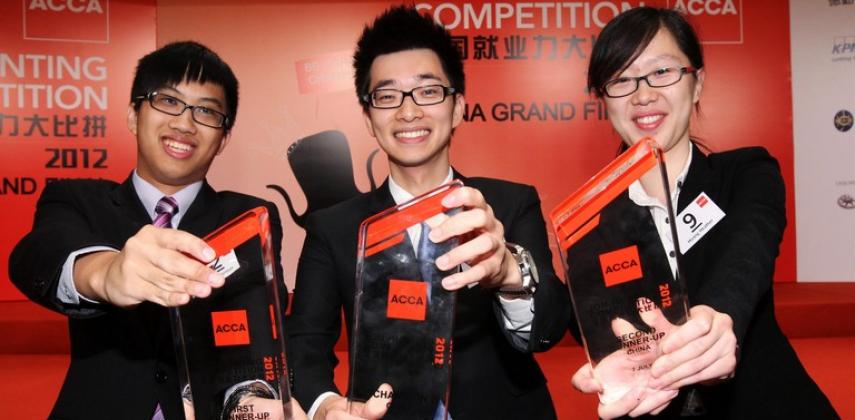A third-year professional-accountancy student from the Chinese University of Hong Kong (CUHK) beat 11 other contestants from four Chinese cities to emerge as the national champion of the Association of Chartered Certified Accountants (ACCA) Job Hunting Competition 2012 China Grand Final.
Harry Yung Ho-shu impressed both the judges and the audience to win the annual contest held this year on July 7 at the Hong Kong Convention and Exhibition Centre.
The nationwide contest aims to provide students with job-hunting skills, and serves as a platform for students from varied backgrounds to learn teamwork while tackling business case studies.
“This signature event is the perfect platform for our future leaders to have a taste of the real business world. At ACCA, we are committed to supporting students and professionals so that they can set themselves apart from the competition and be ready to make the most of every emerging opportunity,” said Ada Leung, head of ACCA China.
“As a global body for professional accountants, we are committed in preparing and nurturing the next generation of accounting professionals by providing an opportunity for aspiring individuals to join the accounting and finance profession with a world-class qualification.”
This year’s 12 finalists beat 2,200 applicants in contests held in Beijing, Shanghai, Guangzhou and Hong Kong. The finalists were split into three groups to discuss and present the best possible solution to a case study prepared by the official case sponsor, TACSEN Management Consultants. Each group, acting as business consultants representing an investment bankers’ consortium, was tasked with presenting a recommendation on a potential investment in a social and e-commerce platform targeting the Chinese online travel market.
Starting with a morning session, the teams were given 10 minutes to read the 10-page-long case question and two hours to discuss and prepare a PowerPoint presentation. In an afternoon session that was open to the public, each team was given 20 minutes to present their recommendation, plus another 15 minutes to answer questions from another contesting team and the judges.
Despite severe time pressure, all three group presentations impressed the judges.
Head judge Anthony Tyen, an ACCA council member, said the contestants were able to grip concepts and ideas, and present in style. “I was very impressed by their self-confidence given their [young] age, the tall order, the limited amount of time, and the differences in backgrounds. Being able to put up a presentation and then answer questions was a clear demonstration of their self-confidence. I see huge potential in the 12 candidates,” Tyen said.
Johnny Chu, audit partner at Deloitte Touche Tohmatsu, said: “Each group had four people with different backgrounds. Each person had a different view, yet we didn’t see them fighting among themselves. That’s impressive. In two hours, they were able to come up with a presentation and give replies to our tough questions as well. It was not an easy task.”
TACSEN managing director Terence Yeung was impressed by Yung’s persuasiveness. “[He] was talking to us instead of talking to the screen or remembering what needed to be said. He talked in a fluid and convincing manner – and with content,” he said.
Edwin Yeung, partner at Fortune International Group, agreed. “[Yung] gave me the impression that he wasn’t just answering our questions. He was explaining things to us,” he said.
Teresa Tso, partner, financial services at Ernst & Young, also admired Yung’s leadership. “He definitely demonstrated his leadership during the [team] discussions. He actually made his team focus on what was key and what was important to the case. He was also the one tracking the time,” she said.
Yung also received the Most Popular Candidate award after receiving the most votes from the audience. As a sideshow, a lucky member of the audience won a new iPad for correctly guessing the grand champion.
Another CUHK professional-accountancy student, sophomore Herman Mok Chi-kit, who, like Yung, is also studying a BBA (Hons) in professional accountancy, won first runner-up.
“[Mok] did quite well in the presentation. During the group discussion, we agreed that [he] was doing the part of moderator and leader. There were quite a number of aggressive candidates within his team, but he was able to calm down everyone. I gave him a lot of credit for that,” Chu said.
Second runner-up was Heather Huang, of the Beijing regional competition and a second-year accounting major at Tsinghua University.
Paul McSheaffrey, partner, audit, at KPMG, called himself Huang’s “perfect fan”.
“She was contributing a lot of ideas and did well in the presentation with the manner of how she spoke and answered questions. She came across as very confident and clear in [her] message. The structure of how she presented her section was engaging and kept our attention.”
Tso said that “during the team discussion, [Huang] was assertive about the points she wanted to make”.
He added: “She was respectful but very clear about her ideas.”
Mok and Huang were also members of the group that won the Best Team Award, group C.
TACSEN’s Yeung said: “Group C’s framework of analysis and what they highlighted were very close to reality. Because I wrote the case, I know what the investor cared more about. Basically it’s about the market potential, about the team, and about the competitive edge of the business model. Group C pinpointed and highlighted these key areas in their analysis, which is very aligned with the business reality.”
Chu added: “[Group C] was also the team that was most interactive. All four members contributed.”
The winners received trophies and cash prizes. Prior to the contest, the 12 finalists attended a job-hunting workshop where they were coached on interview and presentation techniques, and received free career assessments. Some of the finalists also participated in a two-day job-shadowing placement in Shanghai.


